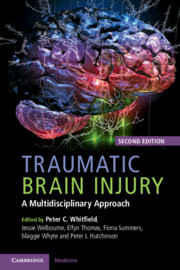Book contents
- Traumatic Brain Injury
- Traumatic Brain Injury
- Copyright page
- Contents
- Contributors
- Foreword to First Edition
- Foreword to Second Edition
- Chapter 1 Epidemiology of Head Injury
- Chapter 2 The Neuropathology of Traumatic Brain Injury
- Chapter 3 Experimental Models of Traumatic Brain Injury
- Chapter 4 Clinical Assessment of the Head-Injured Patient
- Chapter 5 Neuroimaging in Trauma
- Chapter 6 Scoring Systems for Trauma and Head Injury
- Chapter 7 Early Phase Care of Patients with Mild and Minor Head Injury
- Chapter 8 Early Phase Care of Patients with Moderate and Severe Head Injury
- Chapter 9 Interhospital Transfer of Brain-Injured Patients
- Chapter 10 Principles of Head Injury Intensive Care Management
- Chapter 11 Intracranial Pressure Monitoring in Head Injury
- Chapter 12 Multimodality Monitoring in Head Injury
- Chapter 13 Therapeutic Options in Neurocritical Care
- Chapter 14 Therapeutic Options in Neurocritical Care
- Chapter 15 Brain Stem Death and Organ Donation
- Chapter 16 Anaesthesia for Emergency Neurosurgery
- Chapter 17 Surgical Issues in the Management of Head-Injured Patients
- Chapter 18 Craniofacial Trauma
- Chapter 19 Cranioplasty after Head Injury
- Chapter 20 Neurosurgical Complications of Head Injury
- Chapter 21 Paediatric Head Injury Management
- Chapter 22 Assessment of Cognition and Capacity
- Chapter 23 Families
- Chapter 24 Principles of Rehabilitation
- Chapter 25 MDT and Rehabilitation of Head Injury
- Chapter 26 Neuropsychological Rehabilitation
- Chapter 27 Assistive Technology and Rehabilitation
- Chapter 28 Outcomes and Prognosis
- Chapter 29 Medicolegal Aspects of Traumatic Brain and Cervical Spine Injury
- Index
- References
Chapter 6 - Scoring Systems for Trauma and Head Injury
Published online by Cambridge University Press: 28 April 2020
- Traumatic Brain Injury
- Traumatic Brain Injury
- Copyright page
- Contents
- Contributors
- Foreword to First Edition
- Foreword to Second Edition
- Chapter 1 Epidemiology of Head Injury
- Chapter 2 The Neuropathology of Traumatic Brain Injury
- Chapter 3 Experimental Models of Traumatic Brain Injury
- Chapter 4 Clinical Assessment of the Head-Injured Patient
- Chapter 5 Neuroimaging in Trauma
- Chapter 6 Scoring Systems for Trauma and Head Injury
- Chapter 7 Early Phase Care of Patients with Mild and Minor Head Injury
- Chapter 8 Early Phase Care of Patients with Moderate and Severe Head Injury
- Chapter 9 Interhospital Transfer of Brain-Injured Patients
- Chapter 10 Principles of Head Injury Intensive Care Management
- Chapter 11 Intracranial Pressure Monitoring in Head Injury
- Chapter 12 Multimodality Monitoring in Head Injury
- Chapter 13 Therapeutic Options in Neurocritical Care
- Chapter 14 Therapeutic Options in Neurocritical Care
- Chapter 15 Brain Stem Death and Organ Donation
- Chapter 16 Anaesthesia for Emergency Neurosurgery
- Chapter 17 Surgical Issues in the Management of Head-Injured Patients
- Chapter 18 Craniofacial Trauma
- Chapter 19 Cranioplasty after Head Injury
- Chapter 20 Neurosurgical Complications of Head Injury
- Chapter 21 Paediatric Head Injury Management
- Chapter 22 Assessment of Cognition and Capacity
- Chapter 23 Families
- Chapter 24 Principles of Rehabilitation
- Chapter 25 MDT and Rehabilitation of Head Injury
- Chapter 26 Neuropsychological Rehabilitation
- Chapter 27 Assistive Technology and Rehabilitation
- Chapter 28 Outcomes and Prognosis
- Chapter 29 Medicolegal Aspects of Traumatic Brain and Cervical Spine Injury
- Index
- References
Summary
Trauma care systems deal with patients who have an infinite variety of injuries requiring complex treatment. The assessment of such systems is a major challenge in clinical measurement and audit. Which systems are most effective in delivering best outcomes? Implementing recommendations for improved procedures will often incur additional costs – will the expense be worthwhile? Clearly, case-mix-adjusted outcome analysis must replace anecdote and dogma. Outcome prediction in trauma is a developing science that enables the assessment of trauma system effectiveness. This chapter will review some of the commonly used scoring systems and their particular applications in patients with traumatic brain injury.
- Type
- Chapter
- Information
- Traumatic Brain InjuryA Multidisciplinary Approach, pp. 57 - 64Publisher: Cambridge University PressPrint publication year: 2020

